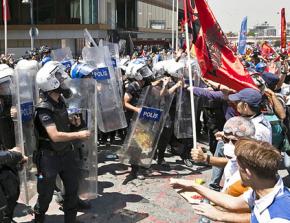Riot police storm Taksim
reports on a massive police assault on peaceful protesters in Istanbul.
HUNDREDS OF riot police, backed up by water cannons and an arsenal of tear gas, stormed Taksim Square in Istanbul on June 11 as protests against the government of Prime Minister Recep Tayyip Erdogan and his Justice and Development Party (AKP) neared their second week. This was the first attempt by police to enter Taksim since they abandoned it on June 1 after a series of confrontations with demonstrators.
The raid began at 7:30 a.m. on June 11 and continued throughout the day. The Taksim Solidarity Platform called for a rally at 7 p.m. to defend the movement from the police assault. Tens of thousands of people responded to the call, and police again unleashed a torrent of violence, lashing the crowd with rubber bullets, tear gas and high-powered water cannons.
"It's going to be hard for Edrogan to explain this away, to send in an overwhelming force to clear people away who were just chanting," said MSNBC reporter Richard Engel from Taksim Square.
The attack surprised many demonstrations since it came just hours after Deputy Prime Minister Bulent Arinc announced that Erdogan would meet with protest leaders the next day.

SO FAR, the demonstrations have spread to 78 cities across the country, and the heavy-handed police response has left two protesters dead and nearly 5,000 injured. The protests grew out of a violent police crackdown against people sitting in at Gezi Park in Taksim Square to prevent a redevelopment project that would replace the green space with a shopping mall built to resemble a military barracks from the days of the Ottoman Empire.
As the battle in Taksim Square raged throughout the day on Tuesday, hundreds of people continued the occupation of Gezi Park nearby. Earlier, the governor of Istanbul, Huseyin Avni Mutlu, announced that police would not enter the park--and were only entering Taksim Square to remove banners and placards placed by various groups. Mutlu's statement suggested that these banners--rather than the brutality of police--were "negatively affecting our country's image in the eyes of the world opinion and leading to reaction from within the society."
Yet despite the governor's announcement, police still made an attempt to enter Gezi Park around 2 p.m., clashing for about 10 minutes with protesters before retreating back to Taksim Square.
Turkish media reported that some protesters in Taksim Square responded to the police raid by throwing Molotov cocktails, but many witnesses say the explosive projectiles were wielded by plainclothes police or agents provocateur. Some posted photos on Twitter showing the supposed protesters bearing guns, walkie talkies and the same gas masks that police use.
"After the incident, a representative from Turkey's Socialist Democracy Party (SDP) issued a statement confirming that the individuals seen throwing the Molotov cocktails were not affiliated with the party, despite photographs of them carrying SDP flags," according to a CommonDreams.org news summary.
The police operation appeared to be part of a larger effort to drive a wedge between radical and moderate protesters. As the assault got underway, Erdogan addressed members of parliament and warned protesters in Gezi Park that they were being manipulated by anti-government groups.
"It's not a place to be occupied...there is a big game being played, using Gezi Park as an excuse," said Erdogan. "They are trying to damage the Turkish economy, shut down the growth of Turkey. I want the Gezi Park protesters to understand that they are being used in a dirty game."
With hundreds of people from all walks of life holding Gezi Park, the government attempted to portray the protesters in Taksim Square, who were largely from various left-wing organizations, as "marginal groups" that must be "dealt with." But considering the massive response to the call for an evening demonstration to defend the square, the effort may have backfired and instead driven together protest currents that the government and police had hoped to isolate from one another.
The brutal response of police and political leaders who command them continues to provide a focus for tens of thousands of people who can agree on one point: they are fed up with what they see as an increasingly out-of-touch and authoritarian government.


